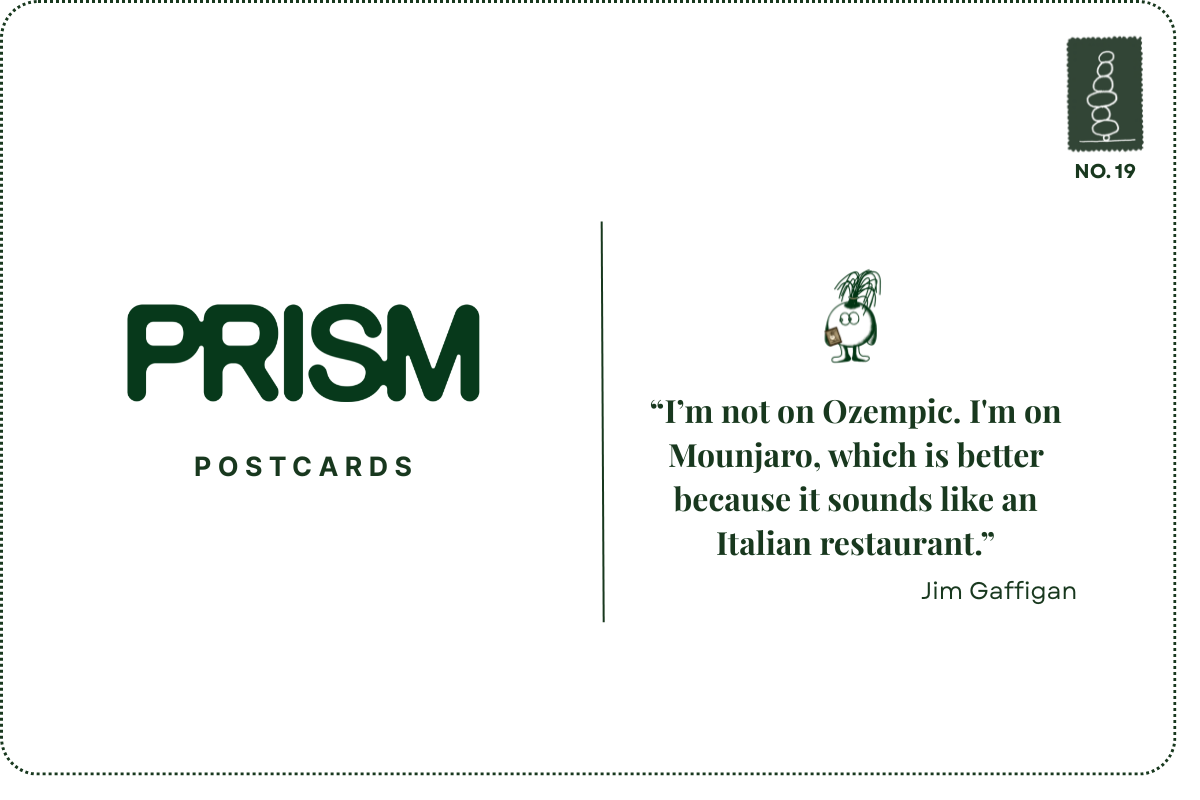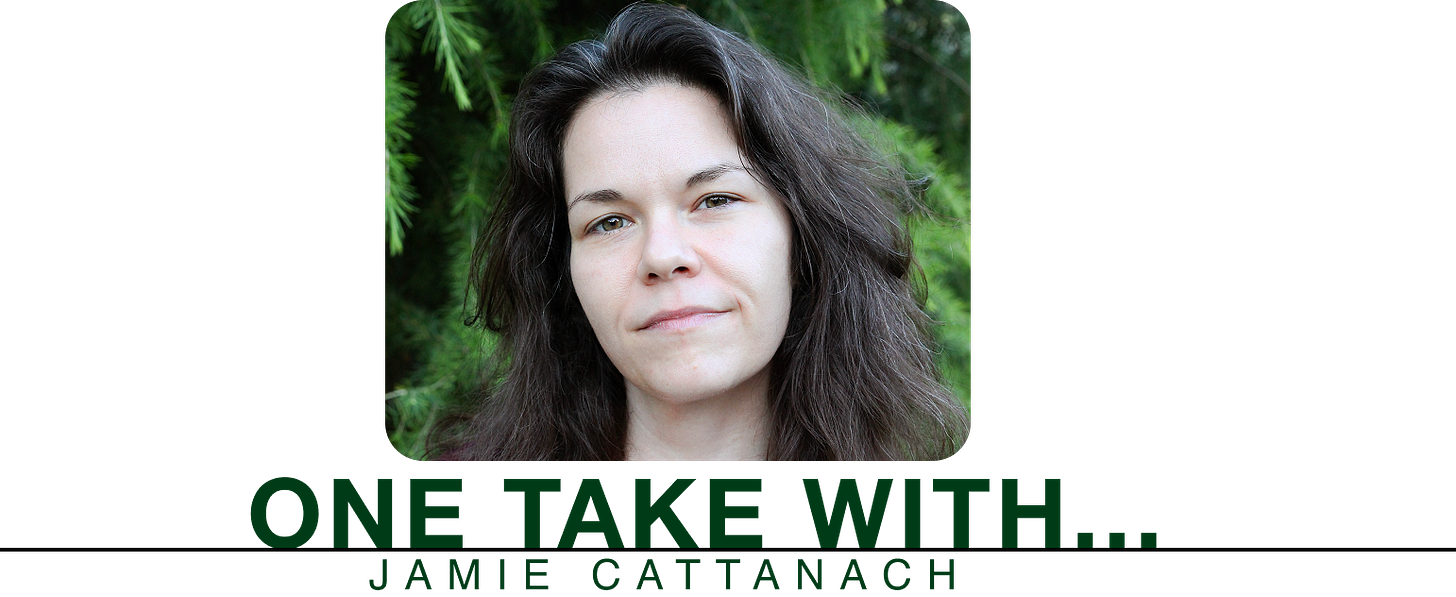The first rule of Ozempic is: you do not talk about Ozempic.
How being real about our bodies got real quiet.
Hi everyone!
Our team was recently having a convo (spirited and procrastinatory, as is our wont) about the things that we *don’t* talk about with friends. We talk about our salaries, our relationships (obviously), our anti-depressants, our weird skin things. Very few topics are actually off limits, except, evidently…Ozempic?
It seems like it’s easy to talk about in the abstract trend way, but harder to talk about with close friends. Luckily, this week’s contributor, Jamie Cattanach, had the same observation and has some thoughts to share.
Read on for her thoughtful meditation on body image in a time of GLP-1s.
Yours in weird skin resources,
The Prism Team
Jamie Cattanach is a Pushcart Prize-nominated writer whose work has been featured in CNBC, SELF, USA Today, Fourth Genre, Colorado Review, Psyche, and many more. Her in-progress memoir about her experience of atypical anorexia was chosen for the Manuscript Mentorship program at the Tin House Winter Workshop in 2022. Jamie lives in Portland, Oregon with her greyhound, Aspen.
One thing that makes Jamie feel well: An A+ night of sleep and the sweet, soft light of dawn that ends it.
Of course we still want to be thin. It would be easier if we could say so.
The spin studio bustled with bodies, the click-clack of cleats, and thudding bass. It was the day after Thanksgiving, a special “power hour” class instead of the usual 45 minutes. “I’m so ready,” I gushed to the instructor, her glittery makeup shimmering as she greeted each rider. “God knows after yesterday, I’ve got plenty to burn!”
She gave a tight smile and said nothing. Twenty minutes later, between sets of tapbacks, she monologued in the motivational way of spin instructors. “You’re here to take up space, not shrink yourself!” she shouted over the music, politely avoiding my gaze. “We’re getting stronger, not smaller!”
Exiting the studio, I felt moved to apologize. Instead, I thanked her for the reminder. “Those old messages are hard to drown out,” we agreed over a sweaty hug.
But the studio had scheduled the power hour right after America’s biggest food holiday. Extended classes were only ever offered around such feast days. And somehow, if I saw them as compensatory, that was my own outdated programming?
Just a few years ago, it was common to encounter expressly fatphobic messaging in gyms: a personal trainer proffering a physical model of five pounds of fat versus muscle; a sign in the shape of a pint glass that read An extra 20 minutes = one more round! “Don’t lift from your foot,” a barre instructor intoned on a tape I played ad nauseum in grad school, directing attention to the abductors in a leg raise. “There’s no fat there.”
Such direct fatphobia is now outré, at least in liberal-coded circles. We talk about being strong, not skinny. We talk — so much — about taking up space.
I appreciate the intention powering this shift — and I’m glad my friends no longer waste time bonding over food shame or complaining about arm flab. But can we be honest? We still want to be thin, even if the official party line has changed. The wild popularity of Ozempic and its ilk — despite the ~$1K price tag — says the quiet part out loud.
Those “old messages” my instructor and I talked about are, in fact, current messages. No amount of sanctimonious aphorisms about the beauty of all bodies can circumvent the endless supply of visual confirmation — in movies, on TV, in social media — that thin = hot, even if “thin” now allows you to have an ass. The occasional “plus-sized” Sports Illustrated Swimsuit Edition covergirl — many of whom are normal-weight women with nary a belly roll in sight — are not the exceptions that prove the rule. They’re not even exceptions.
The only difference is that now, a desire for thinness is cringey to acknowledge — which means that more of us are battling our body image demons alone and in silence.
**
Growing up fat, I’d been certain everything would be better if I were thinner. I’d be happier, more successful, on the inside of every joke.
When I lost 80 pounds in my early twenties, I discovered that in most ways I was, unfortunately, correct. Men who had studiously ignored me suddenly pursued me. Instead of frowning over my paperwork, doctors praised me for my success, even when it led to hypotension and amenorrhea. (I wasn’t diagnosed as anorexic until after I’d regained 40 pounds. Because I’d never been “underweight” by the BMI’s standard, my obvious case had flown under the medical radar.)
It was fun to be looked at. It was fun to buy clothes. It was fun to walk around in the sun without my upper thighs chafing. It was not fun to log everything I put in my mouth — down to a stick of gum or a single cherry. Still, I probably would have done it forever if my body and psyche hadn’t fully revolted, launching me out of bed in the middle of the night to eat raw coconut cream from the can like a calorie-zombie.
I owe my recovery, in large part, to the body positivity movement. I followed influencers who used the word fat with pride instead of shame. I watched every Lizzo music video on repeat. And when the Hulu show “Shrill” came out, I binged it twice in a row, frantically — as if I were studying for a test.
Was it safe — really? — to allow myself to expand? Two decades of jeers and rejections and fitting room failures sat heavy in the back of my mind. But I was so, so hungry.
As I regained weight, the effects of my thinness dissolved. There were fewer held-open doors, fewer smiles from strangers. My period returned; my blood pressure rose to normal. Though my body was happier, I grieved the thin version of myself, which still felt like the real one — despite the idea that I was supposed to feel empowered by letting my body expand. By taking up space.
***
Liv Schmidt, the 23-year-old model who is credited with starting the SkinnyTok movement, was recently demonetized on Instagram — or, as conservative women’s magazine Evie puts it, “Banned for being honest.” Schmidt packages what is pretty clearly anorexia as mindfulness, framing hunger as a “sensation” to sit with. “Being skinny is your personal Power,” she entitled one YouTube video; in another she calls it “self-love.” Thanks in part to the progress of body positivity, Schmidt is being shut down on official channels — though her $20-per-month “Skinni Societé” still boasts, per her reportage, thousands of “girls.”
Mikala Jamison, the author of the Body Type Substack newsletter, calls the rise of #SkinnyTok a “Trumpian backlash to the wellness movement.” Would such a dangerous backlash (whose adherents posit tips like breathing through your hunger or having tea instead of a snack as health advice) have taken root if we were all comfortable being a little more honest about how we really feel about our bodies? There has to be a middle road.
I am in no way advocating a total return to diet culture. But I am a person living in the world, and I am not immune to facts. Having lived in both a fat body and a thin one (and grey areas between), the societal benefits conferred by thinness are — still — facts.
And in the end, our aversion to openly grappling with this reality compounds the suffering. Talking about this piece over the last few weeks, I’ve had several friends tell me I’m the first person they were able to be honest with about their own desire to lose weight.
“You’re the only person I can talk to about this,” they say, looking haunted.
The conversations that ensue can, yes, fit into the constructs of diet culture. We might trade tips about our favorite protein shake recipes or our favorite workout class. We might even sit, honestly, with our desire — or decision — to try a weight-loss drug like Ozempic.
It’s not ideal — the way we feel about our bodies or the world that informs those feelings. But at least, when we’re naming those feelings honestly, we’re not alone.
FIND JAMIE ON
➚ Website
When we asked Jamie if any resources around body image have helped her towards self-acceptance she said uh, no, that’s why I had to write this essay (paraphrasing). So we did some digging on our own.
The best resources we could find explore the concept of body neutrality, defined by this NYT overview article as “the ability to accept and respect your body even if it isn’t the way you’d prefer it to be.” Body neutrality frames the body as neither good nor bad, but rather something that enables you to run fast or lift your toddler or enjoy a plunge in a lake. It’s focused on capability rather than appearance, and suggests the possibility of simultaneously appreciating your body and feeling the desire to change it.
This stands in contrast to body positivity, which calls on people to feel positive (duh) about their bodies, regardless of societal messaging around traditional beauty standards — or how they actually feel. One creator quoted in a recent Journal of Eating Disorders study on body neutrality explains the distinction this way: “‘Practicing body neutrality [is] thinking: okay, this is what my body looks like. Not “YES I LOVE my POOCH. It’s amazing! Nothing wrong with that thinking [body positivity], but it’s not what I’m focusing on.’”
Body neutrality is not (yet) as culturally prevalent as body positivity, as seen in both Google search data and Instagram posts (12.6M posts for #bodypositivity vs. 429K for #bodyneutrality), but it’s worth exploring for anyone feeling overwhelmed by the pressures of societal beauty standards and/or body positivity.
Not sure where to start? This TED Talk gives a good first person account of one influencer’s journey of embracing the ideals of body autonomy (and getting trolled in the process), or, if you want to start with a deeper dive, check out this book and framework from twin PhDs (!) Lindsey and Lexi Kite. Or maybe just start a conversation with a friend or two, like Jamie did :)
Hungry 🤤
Spacious ☁️
Hope your Sunday is more coconut cream pie than raw canned coconut cream.







I honestly really needed to read this. I was called out recently by a friend of mine for always trying to "fix" her problems when she complained to me. She was spot on, and I wasn't being fair to her or her experiences. I think the rhetoric around bodies has pushed us in a similar direction, wherein we're still experiencing problems (like extra long spin classes after the holidays) without the open dialogue.
As a recovered anorexic myself, I totally agree—there has to be some middle ground. In fact, the diet industry IS bad—but so is the fast food industry, and Big Corn syrup, and so are the makeup and clothing industries that appropriated body positive rhetoric. The real fact is that it’s almost impossible to have a healthy normal relationship with food and body weight in modern American society for ANYONE and we should never have framed this as “fat versus skinny” in the first place